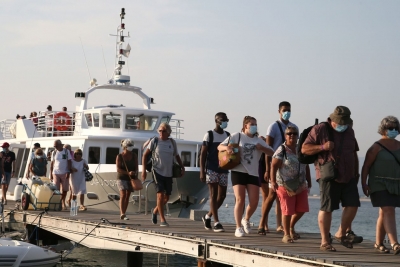
Public-health officials have given cruise lines the green light to begin a phased reopening in the U.S. following months of no-sail orders amid the coronavirus pandemic.
But it could be months before travelers start sailing the high seas again out of American ports.
Last week, the U.S. Centers for Disease Control and Prevention announced it was not extending the full no-sail order that had shut down the cruise industry for months. The no-sail order, as a result, expired on Oct. 31, and in its place the CDC introduced a conditional sail order laying out the requirements that cruise lines must meet to resume operations.
However, on Tuesday, the Cruise Line International Association, the primary trade group representing the cruise industry, announced that its members had elected to voluntarily suspend operations in the U.S. through the rest of the year. This includes the cruise lines owned by Carnival Corp., CCL, 4.91% Royal Caribbean Group RCL, 4.23% and Norwegian Cruise Line Holdings NCLH, 5.38%.
The cruise industry has drawn particular scrutiny — especially compared to other sectors of the travel industry — during the coronavirus pandemic. When coronavirus cases began skyrocketing earlier this year, cruise-ship outbreaks drew extensive media attention. In particular, more than 700 passengers and crew tested positive for COVID-19 on the Carnival Corp.-owned Diamond Princess back in March.
Here is what travelers planning a cruise vacation for next year need to know about the industry’s reopening:
It could be months before cruises start sailing out of the U.S. again
Cruise operators have to accomplish a lot to receive the OK from the CDC to begin sailing out of U.S. ports again. For starters, they must develop their own laboratory testing capabilities onboard their ships so that crew and passengers can be tested for the coronavirus.
After that they need to run simulated voyages designed to test their ability to mitigate the virus during a sailing. These simulated voyages may be open to the public, though it’s not clear what they will entail or how long they would last. The CDC will only allow participants who are adults without any pre-existing conditions that put them at risk of complications were they to contract COVID-19. Once that’s all done, cruise lines will need to submit reports to the CDC to be certified to sail again.
And that’s just the process the CDC is requiring — it doesn’t take into approach how much legwork it will take for cruise lines to bring their crews back on board their ships and retrain them, said Stewart Chiron, a travel expert who runs The Cruise Guy website.
Cruise line employees live all around the world, and some cruise lines had begun taking steps to fly their workers back to the U.S. to resume operations before the CDC issued its new order. “Essentially my understanding is they’re going to make crews quarantine for 14 days ashore and then 14 days aboard the ship,” Chiron said. “That’s a month.”
In that time, cruise operators can work on other elements of their COVID-19-related plans, but travelers in January and February may be disappointed.
“The big question right now is how long it will take lines to implement the necessary protocols to meet the CDC’s requirements,” said Chris Gray Faust, managing editor of travel website Cruise Critic. “Many of those requirements were proposed by the industry itself, but it’s unknown exactly how long it will take to actually execute.”
The presidential election could also play a role in the industry’s ability to reopen. Some reports have suggested that the Trump administration overruled the CDC in extending the no-sail order past Oct. 31 — and House Democrats are reportedly investigating the matter. A Biden administration, if the former vice president is elected, might seek to slow the industry’s reopening, depending on its approach to the pandemic, Chiron said.
Carnival Corp. said that each of its individual cruise lines will communicate their reopening plans on their websites. Among Carnival’s brands are Carnival Cruise Line, Costa Cruises, Holland American and Princess Cruises. “Whenever we restart our cruise operations in the U.S., we certainly look forward to welcoming our guests on board,” Carnival’s CEO Arnold Doland said in a statement while announcing plans to suspend operations until at least 2021.
(Royal Caribbean and Norwegian did not reply to requests for comment.)
Some sailings may be canceled even after a cruise line starts operating again
One restriction the CDC is keeping in place is that cruises, once allowed, can be no longer than seven days. And the public-health agency reserved the right to shorten (or expand) that time frame going forward.
That short time frame may not preclude popular itineraries, such as cruises to the Bahamas or Western Caribbean. But it could mean that certain sailings will not be able to happen. For instance, Panama Canal voyages would not be feasible. Similarly, trips from California to Hawaii and Alaska would likely be off the table based on that timeframe, Chiron said.
Going on a cruise vacation will involve multiple COVID-19 tests
The CDC itself requires that passengers and crew be screened on the day of embarkation and the day of return. Passengers will also be required to have been tested and received results prior to getting on the ship.
And that’s just the tip of the iceberg, where testing is concerned. If cruises do make ports of call, passengers would like be required by those countries to be tested before disembarking the ship. “On a seven-day sailing with a three port stops passengers are going to have to get tested six times,” Chiron said.
Plus, if someone onboard is suspected of having COVID, any close contacts would need to get tested. All told, Chiron suggested that some travelers could find the extensive testing to be too much of an inconvenience.
Many of the perks and amenities of a cruise vacation may be curtailed
The cruising experience may not be as carefree as it once was so long as the pandemic continues, experts said. “We can expect to see much of what we also see on land,” Gray Faust said. This would likely include capacity limits and mask-wearing in other areas. Self-service buffets will likely go by the wayside — though all-you-can-eat dining might stick around, but with gloved employees serving the food instead.
The biggest change, however, could occur in terms of the activities that take place off the ship. “Lines have been leaning into the ability to create their own ‘bubble’ of sorts with pre-cruise COVID testing, as well as ship-sponsored shore excursions that require guests to take protected offerings set up by the cruise line,” Gray Faust said, describing what operators have done in Europe.
So, rather than being able to plan out your own activities when visiting a port, travelers will be required to book a pre-designed excursion from the cruise line directly.
In fact, cruise lines will likely be so strict about what passengers can and can’t do when at a port of call that rule-breakers could be denied re-entry to the ship, the Cruise Line International Association has said.
The other factor here is whether Caribbean nations will allow cruise ships to return. At least one cruise line has resumed sailings out of Barbados, but the region otherwise has not seen activity since the pandemic began. While the cruise industry is critical to many of these countries’ economies, the public health risk could lead to some states opting not to allow visitors in.
If you cancel, the cruise line might give you a voucher worth more than your original trip
Each cruise line handles refunds, credits and rebookings differently, Gray Faust said. “There is no industry policy for what is offered to guests who choose to cancel on their own terms,” she said.
Most cruise lines have relaxed their policies since the pandemic began in a bid to retain customers.
If the cruise line cancels your sailing, however, you are likely entitled to a refund. However, in most cases, the operator will automatically provide you with a future cruise credit instead, and you will need to proactively seek the refund.
But there could be benefits to waiting. Travel experts said that some cruise lines have offered future cruise credits that were worth more than what a passenger already paid, which could be beneficial for those looking to plan a trip in the more-distant future.
By Jacob Passy, MarketWatch
Re-posted on CruiseCrazies.com - Cruise News, Articles, Forums, Packing List, Ship Tracker, and more
For more cruise news and articles go to https://www.cruisecrazies.com
Edited by Jason












Recommended Comments
There are no comments to display.
Join the conversation
You can post now and register later. If you have an account, sign in now to post with your account.